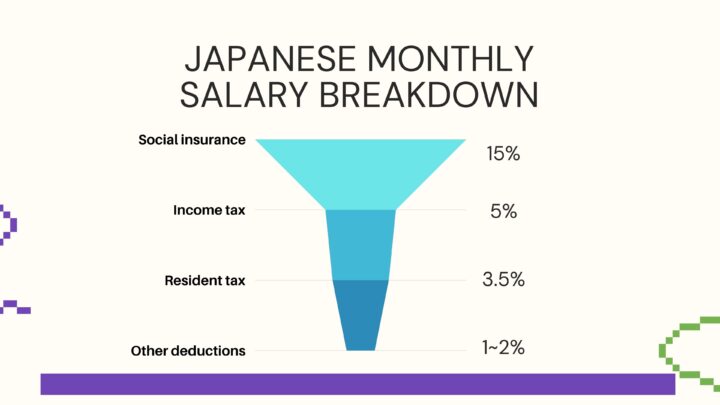Talking about money in Japan can feel like walking on eggshells — people rarely discuss their income openly, yet it shapes nearly every aspect of daily life. For foreigners planning to work or move here, understanding salaries in Japan is just as important as grasping the etiquette of bowing or the train system. This guide will walk you through the averages, industry examples, and what you can realistically expect in yen and dollars.
Average Salary in Japan

In 2025, the average monthly salary in Japan sits around ¥420,000 (≈ $2,800 USD). That means a yearly average of about ¥5,000,000 to ¥5,500,000 (≈ $34,000–$37,500 USD). Of course, averages hide extremes: Tokyo salaries skew higher, while rural regions tend to pay less.
When you compare this with the minimum wage in Japan, it’s clear that while basic wages are slowly rising, they don’t always keep pace with inflation. Many foreign workers find the cost of living manageable when earning close to or above the average, especially if their employer covers housing or transportation allowances.
Read More
Speak To Our Consultants To See How You Can Successful Relocate to Japan
Arrive in Japan ready to live long-term. No scrambling. No confusion. Step into Japan with your life already lined up.
Book Your FREE Consultation →✓ English-speaking support ✓ 500+ Bookings
Japanese Monthly Salary Breakdown

Salaries in Japan are usually quoted as gross (before deductions). Here’s how an average monthly salary of ¥420,000 (≈ $2,800 USD) might break down for a full-time employee in Tokyo:
- Income tax: about ¥20,000 (≈ $135 USD), roughly 5% of salary
- Resident tax: about ¥15,000 (≈ $100 USD), around 3.5%
- Social insurance (health, pension, unemployment): ¥60,000–¥70,000 (≈ $400–$470 USD), around 15–17%
- Other deductions (union fees, company pension plans if applicable): ¥5,000–¥10,000 (≈ $35–$70 USD), around 1–2%
After these deductions, the take-home pay is about ¥310,000–¥320,000 (≈ $2,100–$2,200 USD), or roughly 75% of the gross.
Bonuses, often paid twice a year, can add one to three months’ worth of salary on top of this, but they are not guaranteed.
English Teacher Salary in Japan

Teaching English remains one of the most accessible jobs for newcomers. Salaries vary depending on your role:
- ALT teachers (Assistant Language Teachers, often placed through JET or dispatch companies) usually earn ¥200,000 to ¥250,000 (≈ $1,350–$1,700 USD) per month. See our dedicated guide on being an ALT teacher in Japan for the full breakdown.
- Eikaiwa teachers (private conversation schools) might earn slightly higher, around ¥250,000 to ¥300,000 (≈ $1,700–$2,000 USD) per month, though hours can be irregular.
- University positions or private school jobs pay the most, sometimes exceeding ¥350,000 to ¥400,000 (≈ $2,400–$2,700 USD) per month, but those require advanced degrees or teaching licenses.
It’s not a path to wealth, but for many, the experience and cultural exchange outweigh the paycheck.
Read More
Software Engineer Salary in Japan

Japan’s tech industry is steadily globalizing, and demand for engineers continues to grow. The average software engineer salary is roughly ¥6,000,000 per year (≈ $40,000 USD).
Entry-level coders may start closer to ¥3,500,000 annually (≈ $23,000 USD), while senior engineers, especially in Tokyo startups or foreign firms, can command ¥8,000,000 to ¥10,000,000 per year (≈ $54,000–$67,000 USD). Fluency in Japanese helps unlock higher salaries, but even without it, tech remains one of the better-paying fields for foreigners.
Doctor Salary in Japan

Medical salaries in Japan are often lower than in countries like the US, but they remain well above the national average. Doctors typically earn between ¥10,000,000 and ¥12,000,000 annually (≈ $67,000–$80,000 USD).
Specialists, surgeons, or doctors working in private clinics can make considerably more, while younger doctors in training earn much less. It’s worth noting that long hours and administrative duties are a big part of the profession here, reflecting Japan’s broader work culture.
Nursing in Japan Salary

Nurses in Japan earn far less than doctors, but the profession is steady and in high demand. On average, a registered nurse earns ¥3,500,000 to ¥4,500,000 per year (≈ $24,000–$30,000 USD).
For foreign nurses, the biggest hurdle isn’t salary, but licensing and language: the national nursing exam must be taken in Japanese, which requires strong language proficiency. Still, for those who qualify, nursing can provide job security in a system that prizes reliability and discipline.
Salary expectations in Japan depend heavily on industry, location, and seniority. While English teachers may find themselves on the lower end of the spectrum, tech professionals and medical staff earn comfortably above the average. If you’re weighing a move, compare these figures not just with your home country’s wages, but also with Japan’s cost of living, especially regarding housing and utilities in cities like Tokyo or Osaka.
Understanding salaries is one part of the bigger picture. Be sure to check our guide to the minimum wage in Japan for context, and if teaching is on your radar, our breakdown of working as an ALT teacher will help you plan realistically.










